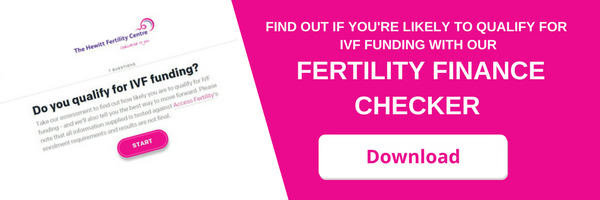
According to the National Institute for Clinical Excellence (NICE), women aged under 40 should be offered three cycles of IVF treatment on the NHS.
If they’ve been trying to get pregnant through regular unprotected sex for two years or if they’ve not been able to get pregnant after 12 cycles of artificial insemination, according to Nice, they should be eligible for three rounds of free treatment.
If your IVF treatment on the NHS has failed, don’t fret. Although it may feel like you’ve exhausted your options, there are still some avenues open to you. It’s important to understand why your IVF treatment might have failed, and equally important to realise that it’s not your fault, and you’re not alone.
Experts believe that 90% of IVF treatments fail because the embryo fails to grow, as opposed to it being a problem with the uterus. The reasons for embryo growth problems are mainly chromosomal abnormalities. But trying to identify a particular defect after the event is almost impossible.
Don’t give up all hope if your NHS IVF treatment has failed - have a read through these alternative routes instead…
- Take time out - it’s a good idea to wait a couple of months if your IVF treatment on the NHS has been unsuccessful before embarking on another course of treatment. This will allow you a break from all the stresses of the treatment and allow your body time to rest and recover. Don’t be too hard on yourself and try to be patient. During the break, you can chat to your doctor about why the fertility treatment failed, how you and your partner feel about it and your options going forward. It can sometimes help to talk to other couples who’ve had a similar experience.
- Private treatment - whether you’ve tried three cycles of IVF on the NHS and it hasn’t been successful, or you’re not actually eligible for IVF on the NHS (e.g. over the age limit), then you can receive treatment at a private clinic. Some clinics may be contacted directly without having to go through your GP, but if you feel more comfortable doing so, you can ask your GP for a referral. One in every 50 babies born in the UK is a result of IVF treatment, but six out of every 10 IVF cycles are funded privately. Each cycle typically costs between £5,000 - £10,000.
- Make sure you’re getting support - unsuccessful IVF treatment can be physically and mentally exhausting, especially if you’ve tried more than once. It’s so important that you get enough support, not just after your treatment, but before and during it, too. There tend to be lots of specialists who are available to speak with people going through fertility treatment. You could also ask your doctor if they know of any patient groups where you can meet other couples who are going through something similar.
- Stay positive - make sure you don’t shut down communication between you and your partner. You’ll both be feeling the effects of a failed IVF cycle and it’s not an easy thing to go through alone - continue to talk to one another and trust that what’s meant to be, will be. Keep a positive mental attitude and emotionally support one another - it’s so important.
- Join IVF discussion groups - luckily, there are hundreds of couples who receive IVF treatment, and better yet, thousands of online forums where you can talk with like-minded women and men who are experiencing similar things. Sometimes you might just need to hear a little encouragement while you’re going through IVF, or you might need the reassurance that no, IVF doesn’t always work straight away - it’s different for everybody. If you’re looking for an IVF discussion group, head to Netmums or Baby Centre.
If you're considering your options and want to know if you could qualify for financial help, try our Fertility Finance Checker.





